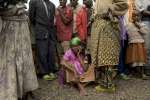Courage of Congolese refugees should be matched by solidarity of international community, says High Commissioner
News Stories, 28 February 2006

BARAKA, DRC, Feb 28 (UNHCR) – Speaking in their own language, UN High Commissioner for Refugees António Guterres Tuesday welcomed 401 Congolese refugees home as they disembarked in Baraka from a former German imperial warship that is said to the oldest working vessel in the world.
"Karibu sana, karibu sana, karibu sana," Guterres called out to the returnees in Kiswahili – "you are very welcome" – as they arrived in this port in the eastern Democratic Republic of the Congo (DRC) after an eight-hour journey across Lake Tanganyika from refugee camps in Tanzania where they have lived for up to nine years.
Since last October, the UN refugee agency has brought home more than 11,000 refugees on ships that make the crossing twice a week.
The German-made MV Liemba, which brought this group home, began life in 1912 as the Graf von Poetzen, and was carried by porters overland to the lake in 5,000 crates to be re-assembled as a warship when Tanzania was a German colony. Although it has been sunk twice over the years, it always came back to life and was converted from steam to diesel in the 1970s, when it resumed life as a transport ship.
After meeting Tuesday's returnees, as well as returnee schoolchildren who returned earlier, Guterres said "there is no task that is more noble than helping people go back to their homeland."
He said the courage of Congolese refugees in going home to a war-ravaged country that is short on all basic services must be matched by "the solidarity of the international community."
Guterres called on all the people in the West who are sitting comfortably in their own homes with their own families to put pressure on their politicians to help the DRC and to help all refugees to return home.
On the third day of an unprecedented joint mission with the heads of the World Food Programme and UNICEF, James Morris and Ann M. Veneman, Guterres visited two schools in this town in South Kivu, which barely existed a year ago before refugees started coming home.
At M'Shimbakye Primary School, a teenage girl welcomed the three visitors and thanked the three UN agencies for their contributions: the UN children's fund, UNICEF, for school materials; WFP for food for pupils and their mothers, and UNHCR for school furniture, school fees and uniforms.
Still, the teenager told them, many problems remain. "Many pupils are forced to drop out because of the inability of parents to pay school fees," she said. "The school has not been totally rehabilitated and we don't have enough school books."
After serving beans and rice (donated by WFP) to some of the pupils, Guterres paid homage "with a great deal of emotion" to the courage of the Congolese people in registering to vote and then voting in a constitutional referendum in huge numbers. Democratic elections are scheduled for June for the first time in 45 years.
He said that for the international community, what is at stake in this huge nation in the heart of Africa is not only the lives of individual Congolese, "but one is playing with the stability of Africa and the peace of the world."
After a five-hour visit to Baraka, the three heads of agencies were scheduled to travel to Kigali, the capital of Rwanda, where they are to meet President Paul Kagame.
By Kitty McKinsey in Baraka, DRC

















































